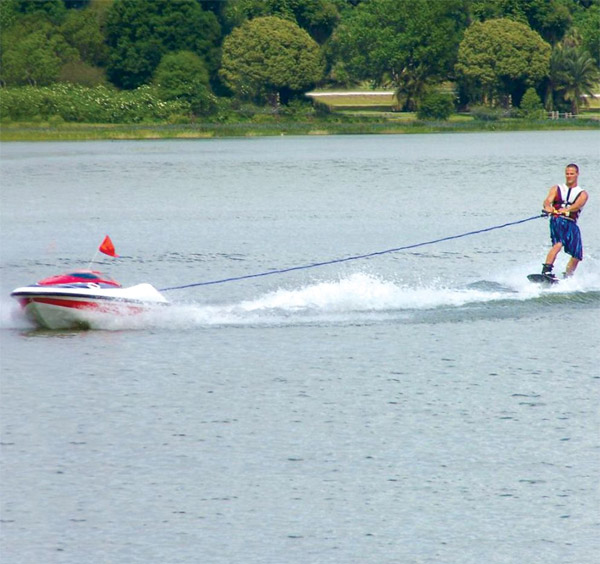Yes No Share to Facebook
Waterskiing Without Observer Aboard
What Happens When the Law Can Be Interpreted In Multiple Ways and One Way Makes a Person Guilty and Another Way Makes a Person Not-Guilty?
To Ski or Not to Ski, That Is the Ambiguous Question
 Imagine a scenario where an operator of a watercraft is charged under s.250(1) of the Criminal Code of Canada, R.S.C. 1985, c. C-46 for operating a watercraft while towing a water-skier without another person onboard acting as the spotter and wherein such a scenario the operator, spotter, and skier are all the same person? This scenario did actually occur and was the issue of concern in the case of R. v. Gatt, 1992 CanLII 1105 wherein the Supreme Court of British Columbia found that the law can be interpreted in a manner that makes the operator/spotter/skier both guilty as well as not-guilty at the very same time. Luckily for the operator/spotter/skier, when a criminal law can be interpreted in a way that creates guilt while a not guilty interpretation also exists, the not-guilty interpretation is the interpretation that is applied.
Imagine a scenario where an operator of a watercraft is charged under s.250(1) of the Criminal Code of Canada, R.S.C. 1985, c. C-46 for operating a watercraft while towing a water-skier without another person onboard acting as the spotter and wherein such a scenario the operator, spotter, and skier are all the same person? This scenario did actually occur and was the issue of concern in the case of R. v. Gatt, 1992 CanLII 1105 wherein the Supreme Court of British Columbia found that the law can be interpreted in a manner that makes the operator/spotter/skier both guilty as well as not-guilty at the very same time. Luckily for the operator/spotter/skier, when a criminal law can be interpreted in a way that creates guilt while a not guilty interpretation also exists, the not-guilty interpretation is the interpretation that is applied.
The Law
Per s.250(1) of the Criminal Code of Canada:
250 (1) Every one who operates a vessel while towing a person on any water skis, surf-board, water sled or other object, when there is not on board such vessel another responsible person keeping watch on the person being towed, is guilty of an offence punishable on summary conviction.
On a strict review of the law as written, the law applies clearly to create guilt. Quite simply, the operator of the vessel (boat) was operating the vessel without "another responsible person keeping watch". Very clearly this true and therefore a verdict of guilty should apply. However, there is also the qualifier of "when there is not on board such vessel another responsible person". This additional qualifier creates an almost paradoxical 'chicken and egg' type confusion. How could there be "another" person on board when there is not even any person on board in the first place? A mathematician might see this scenario as equivalent to the mathematical problem of multiplying any number by zero - the answer is always zero.
While interpreting the law, the British Columbia Supreme Court noted:
It is implicit in the use of the word "another" that it presupposes a person other than the watcher is also on board the vessel and that that person is the operator of the vessel which as already mentioned was the likely intention of Parliament. Under this interpretation, a person who operates the vessel while not on board and without a watcher, would not be caught by the provisions of s. 250.(1). However, one could, with some effort, interpret "every one" so as to mean that whenever a person operates the vessel, regardless of whether on board or off the vessel, that there must when towing a water skier be another responsible person on board the vessel keeping watch on the water skier. This interpretation would of course include a water skier who is operating a Ski-Free and if without a watcher on board would be caught by s. 250(1). Of the two interpretations the first, while perhaps not preferable from a practical viewpoint, is the more reasonable, not only on the basis of the words and language used in s. 250.(1), but also on considering the apparent purpose of the section. Its object is to prevent danger or situations of harm to water skiers and others using the waterways by requiring the operators of vessels towing a water skier to watch the navigation before them and another responsible person on board to keep watch of the person being towed. It makes little sense to require another person to be on board the vessel to keep watch on the operator of the vessel. Regardless, where a reasonable doubt or ambiguity appears in the interpretation of a penal statute with one interpretation leading to innocence and the other to guilt, it must be resolved in favour of the person charged.
Accordingly, the law works such that operator/spotter/skier is guilty and not-guilty at the same time which is therefore an ambiguity that causes a judicial paradox and brings a not-guilty decision.